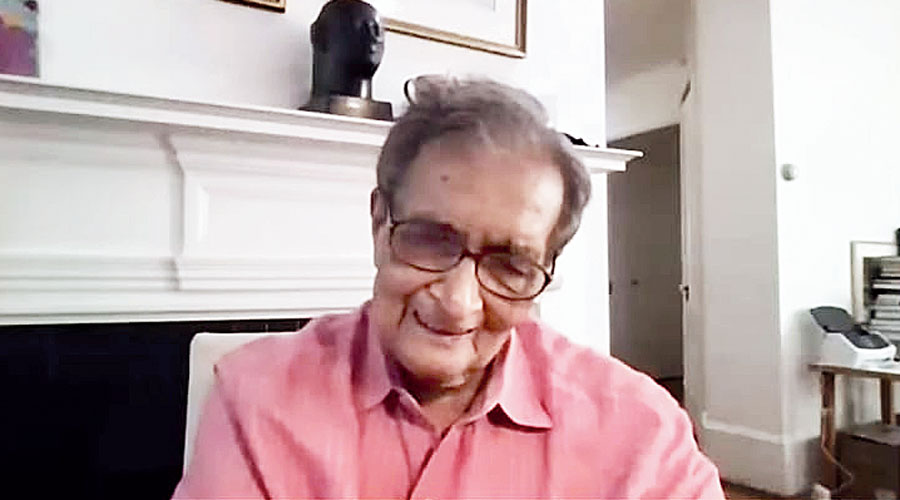Nobel laureate Amartya Sen’s new book, Home in the World: A Memoir, was launched in Kolkata on Saturday.
The programme was organised by Bengal Club as part of its Virtual Library Talk series, in association with The Telegraph.
The virtual launch of the book, by Gopalkrishna Gandhi, former diplomat and governor of Bengal, now distinguished professor of history and politics at Ashoka University, was followed by a conversation about the book between Sen and historian and Ashoka University chancellor Rudrangshu Mukherjee.
“This is a very special day in the history of this historic institution. It is a triumvirate of cerebral celebrities that we have in our virtual midst,” neurosurgeon Sandip Chatterjee said at the outset.
The book is a memoir of the first 30 years of Sen’s life.
“It is a singular honour and pleasure to hold up the book…. The book is a memoir. So, it is about his life. But it is also about his times. In all the places he has been in…. His thoughts have travelled, his ideas have journeyed. The book is about his experience, strengthened by his description of the fragility of ideas, including his own. Every nugget is a nuance,” said Gandhi.
Excerpts from the conversation that followed:
Beyond tolerance
Alongside Rabindranath Tagore, who has been a major influence on Sen despite the fact that he was seven when Tagore died, the book dwells significantly on Kshitimohan Sen, the author’s maternal grandfather who taught in Santiniketan.
“Kshitimohan Sen is, unfortunately, today, practically a forgotten figure. Till you came to Presidency College, even after that, he was the most formative influence, intellectual and otherwise. May be, you could talk a little on him,” Mukherjee asked Sen.
Sen called Kshitimohan a “tremendous influence” in his thinking.
“He was a religious man in a very broad sense. His book on Hinduism, which ultimately fell on me to edit in English…. While working on it, I could understand his attitude towards religion. He was quite striking in a sense that has become quite uncommon in India now. Mainly, he had a positive attitude towards Islamic thinking.
“He found the idea of Hindu-Muslim relations in the form of tolerance as very defective and very deficient. Because, as he put it to me a number of times, it is not so much that what we are celebrating — that Hindus are tolerating Muslims and Muslims are tolerating Hindus. But they were creating things together. The joint creation, the creativity that he was looking at rather than simply tolerating each other,” said Sen, going on to give an example.
“It is striking that the first translation of the Upanishad in a language (Persian) other than Sanskrit was done by Dara Shikoh. He is the son of Mumtaz who was the senior queen of Shah Jahan, in whose memory the Taj Mahal is built.”
Two places
Presidency College (now university) and Trinity College, Cambridge, are two important institutions in Sen’s life. Mukherjee cited an interview of Sen where he had said that when he arrived at Trinity, he was “surprised that in Presidency, you were actually taught more technical economics than you were actually being taught in Cambridge”.
“How do you think that came about? Was it because of the presence of Tapas Majumdar (Sen’s teacher at Presidency), who was also a very important influence in your life?” asked Mukherjee.
“I think certainly that Tapas Majumdar would have contributed to it. But Presidency College had a tradition of making people in one area of expertise take interest in another area,” said Sen.
“I think, a remarkable example of that is the emergence of statistics in India. P.C. Mahalanobis was really a physicist. When he decides to become a statistician, what he is doing is making use of his understanding of mathematical physics to frame the basis of mathematical statistics as it becomes a major institution of science. I was very lucky to see that. I knew Mahalanobis well.
“In the Presidency College atmosphere, there was a fair amount of technicality (of economics) along with an interest in human beings. There were people who were not teachers but connected with it, in Presidency, who had an interest in economics. It seemed quite natural to go in that direction. So, Presidency went on to be one place that students had to learn from if they were to do economics, in a way that Cambridge would not consider for at least another 10 or 15 years. I think the good thing is that it did not need to neglect the human aspect of economics. That was still strong,” he said.
